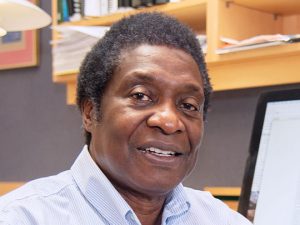
Steenbock Professor of Nutritional Sciences
Professor of Biochemistry
B.S. 1975, Makerere University, Kampala Uganda
Msc. 1978, Makerere University Kampala Uganda
Ph.D. 1985, Johns Hopkins University School of Medicine
- Stearoyl-CoA Desaturases regulate stem and progenitor cell metabolism and function in response to nutrient abundance
- Stearoyl-CoA desaturase 1 deficiency drives saturated lipid accumulation and increases liver and plasma acylcarnitines
- Intestinal stearoyl-coenzyme A desaturase-inhibition improves obesity-associated metabolic disorders
- Stearoyl-CoA Desaturase 1 Regulates Metabolism and Inflammation in Mouse Perivascular Adipose Tissue in Response to a High-Fat Diet
- SCD4 deficiency decreases cardiac steatosis and prevents cardiac remodeling in mice fed a high-fat diet
- Hepatic stearoyl-CoA desaturase-1 deficiency induces fibrosis and hepatocellular carcinoma-related gene activation under a high carbohydrate low fat diet
- Activation of Peroxisome Proliferator-Activated Receptor-β/δ (PPARβ/δ) in Keratinocytes by Endogenous Fatty Acids
- A Conversation with James Ntambi
- Fatty acid desaturation by stearoyl-CoA desaturase-1 controls regulatory T cell differentiation and autoimmunity
- Hepatic oleate regulates one-carbon metabolism during high carbohydrate feeding
The general theme of my research is to understand the genetic regulation of metabolism, adipocyte biology and differentiation. I am specifically interested in the genetic basis of obesity, cardiovascular disease, insulin resistance and diabetes and how dietary factors, hormones and environmental factors influence these disease states. In particular, I study the regulation of the mammalian stearoyl-CoA desaturase (SCD) genes that encode an enzyme involved in biosynthesis of monounsaturated fatty acids. WE are using these genes as a model to understand nutrient gene interactions. We have recently genetically engineered mice that are born without the stearoyl-CoA desaturase gene-1 and found that these mice resist obesity, diabetes, fatty liver disease, and other aspects of the metabolic syndrome.
I am also interested in conducting research on obesity and diabetes and other non-communicable metabolic diseases in developing countries. I provide advice on how to prevent or delay the progression of metabolic diseases through nutritional interventions.
- Named the 2024 recipient of the Global Research & Outreach (GRO) Award from UW CALS Global
- Named Fellow of the American Society of Biochemistry and Molecular Biology (ASBMB) – 2023
- Re-elected Council Member of the American Society of Biochemistry and Molecular Biology (ASBMB) – 2021
- Appointed Council Member of the American Society of Biochemistry and Molecular Biology (ASBMB) – 2018
- Wisconsin Without Borders Peter Bosscher Award – 2016

